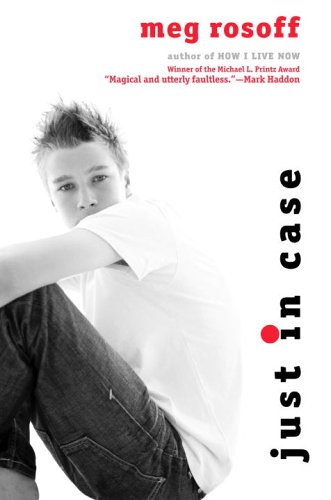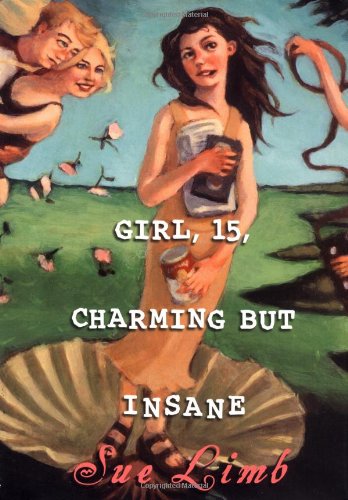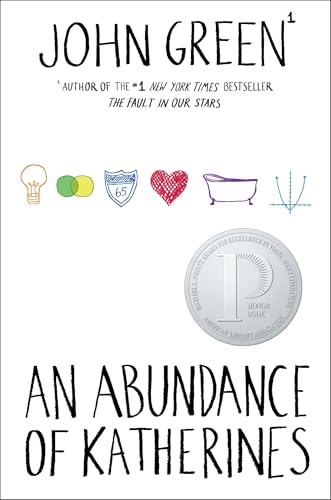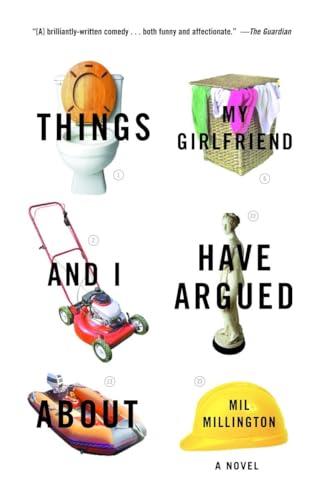Imbuing characters with a rich internal fantasy life is hardly an unusual concept. Children routinely create imaginary friends. Beyond childhood, the notion of older characters, whether through trauma or alientation from “consensus reality,” retreating into an alternate reality of their own imagining is rich dramatic material. But when fifteen-year-old David Case realizes that the merest chance separates routine life from catastrophe and chooses to adopt new clothes, a new outlook, even a new identity — Justin Case — in a deliberate and rationally considered effort to elude fate, his path is anything but routine.
For one thing, the boundary between “reality” and his imaginings becomes... porous. And for another, fate — or should I say, Fate — really is out to get him.
 With Just in Case, Meg Rosoff takes the commonly accepted conventions of realistic fiction and turns them on their head. The fact that Justin creates an imaginary dog — a greyhound named Boy — for himself is not in and of itself remarkable. That his new friend Peter actually sees the dog and interacts with him as if nothing is out of the ordinary is astonishing. Justin’s year-old brother Charlie, whose near-death is the catalyst for Justin’s quest to escape Fate’s notice, is not an innocent baby, but demonstrates an intelligence and intuition far beyond anyone around him; he is limited only by his inability to communicate his singular awareness to those around him. And Fate is not some metaphorical expression of the vagaries of random chance, but an active antagonist playing games with Justin’s life for his own amusement, continually throwing elaborate obstacles — even extreme obstacles — into Justin’s path and the paths of those around him, all the while offering boldface commentary on the results.
With Just in Case, Meg Rosoff takes the commonly accepted conventions of realistic fiction and turns them on their head. The fact that Justin creates an imaginary dog — a greyhound named Boy — for himself is not in and of itself remarkable. That his new friend Peter actually sees the dog and interacts with him as if nothing is out of the ordinary is astonishing. Justin’s year-old brother Charlie, whose near-death is the catalyst for Justin’s quest to escape Fate’s notice, is not an innocent baby, but demonstrates an intelligence and intuition far beyond anyone around him; he is limited only by his inability to communicate his singular awareness to those around him. And Fate is not some metaphorical expression of the vagaries of random chance, but an active antagonist playing games with Justin’s life for his own amusement, continually throwing elaborate obstacles — even extreme obstacles — into Justin’s path and the paths of those around him, all the while offering boldface commentary on the results.And all of this is enveloped in a tale of teen awakening that is readily accessible and indentifiable; his story may hardly be universal, but his path is instantly recognizable to anyone who has felt dwarfed by forces beyond individual control. Justin’s need to strike out from his maddeningly oblivious parents and seek his own path. His efforts at self-discipline through cross-country running. His involvement with Agnes Day, an eccentric young photographer who may be simultaneously his gateway to a larger world (both internal and external) and the toxic instrument of his psychological collapse. And his continuing (and repeatedly thwarted) quest to come to terms with the consequences of Fate’s callous manipulation.
The novel is hardly light material, but neither is it heavy-handed in its “message.” In fact, the playful thwarting of convention allows Rosoff to convey themes of deep philosophical significance without venturing into lecture or ponderous narrative. The reader can empathize with Justin’s plight while retaining a perspective that allows for greater understanding than the wounded Justin possesses. In all, Just in Case is an intriguing and provocative meditation on the nature of destiny and free will, wrapped up in a thoroughly enjoyable narrative package. It’s the best kind of “learning” experience: one you barely realize you’re thinking about.
























1 comment:
My favorite thing about kidlitoshpere blogs is my ever-changing list of books-to-read. I remove books as I find and read them, and print a new list every month that goes with me everywhere.
I appreciate reviews like this. Thanks!
Post a Comment